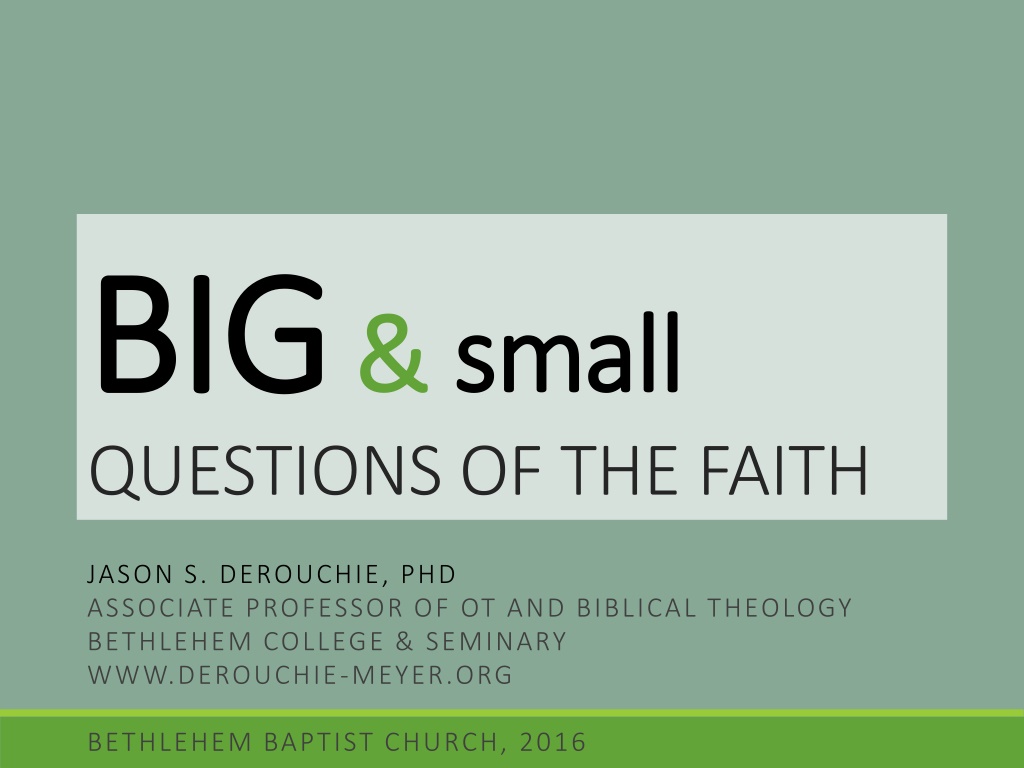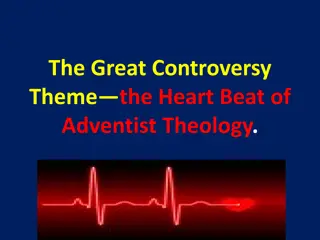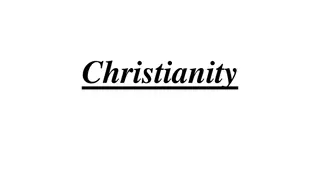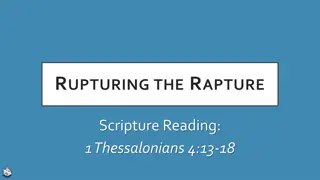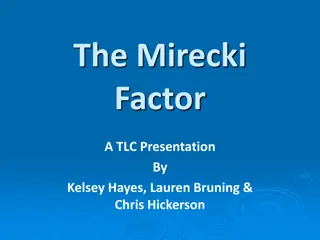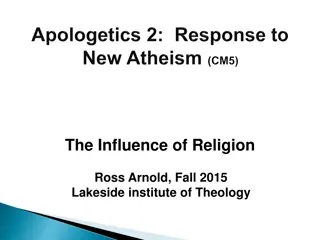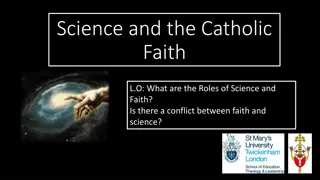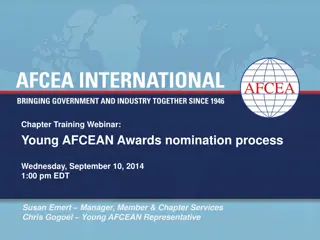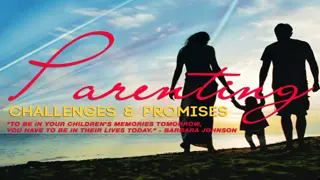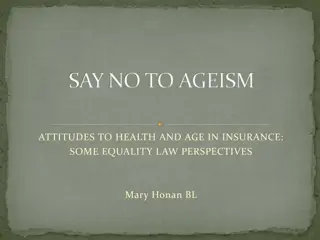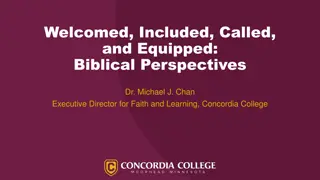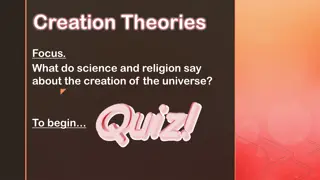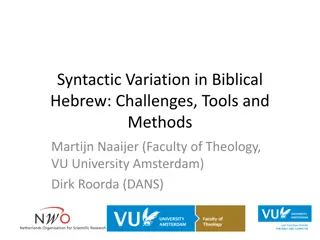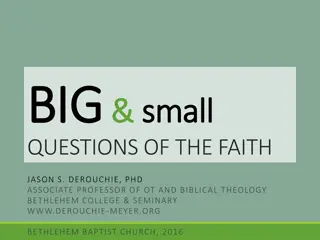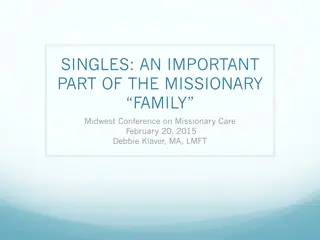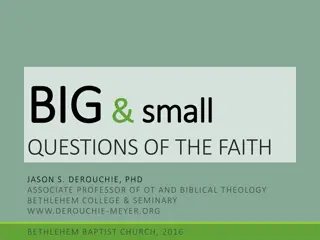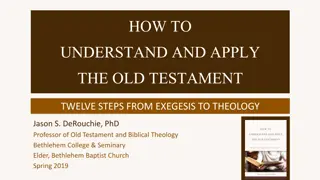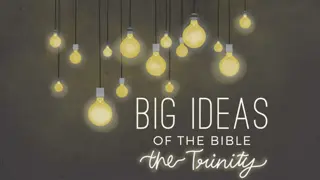Understanding Young Earth Creationism: Biblical Perspectives on the Age of the Earth
Exploring the viewpoint of Young Earth Creationism (YEC) based on biblical arguments, this content delves into the belief that God created the earth in six 24-hour periods, making it exceptionally young by conventional scientific standards. The discussion focuses on the biblical passages and theological rationale supporting YEC, emphasizing humanity's pivotal role within creation and the significance of a recent origin for the earth and mankind. Key verses from Genesis and the New Testament are highlighted to illustrate the theological foundation of YEC.
Download Presentation

Please find below an Image/Link to download the presentation.
The content on the website is provided AS IS for your information and personal use only. It may not be sold, licensed, or shared on other websites without obtaining consent from the author. Download presentation by click this link. If you encounter any issues during the download, it is possible that the publisher has removed the file from their server.
E N D
Presentation Transcript
BIG BIG& &small QUESTIONS OF THE FAITH small JASON S. DEROUCHIE, PHD ASSOCIATE PROFESSOR OF OT AND BIBLICAL THEOLOGY BETHLEHEM COLLEGE & SEMINARY WWW.DEROUCHIE-MEYER.ORG BETHLEHEM BAPTIST CHURCH, 2016
QUESTION Why do you hold to YEC, believing that God created a mature earth in in six 24-hour periods in a literal week and that the earth is extremely young 6,000 10,000 earth-years old?
YEC: Biblical Arguments YEC: Biblical Arguments Gen 1:1 2:3 places humanity within the first week of creation. The NT closely associates the history of Genesis 2 4 with the beginning of the world. Genesis linear genealogies in chs. 5, 11 point to a recent humanity.
Mankinds station as the climax of creation and sole image of God and Adam s role as head of the first creation supports a young earth. o It seems unlikely that the earth would be millions or billions of years old and yet humanity very young, for mankind was the peak of God s creative activity and God made Adam covenantal head over all the first creation. o Genesis 1:1 2:3 associates all major rulers of the first creation with humanity: Luminaries (Gen 1:14 with 15:5; Jer 33:22) All terrestrial creatures (Gen 1:28)
o Humans are the climax of creation and sole representatives of God on the earth, with some being chosen in Christ before the foundation of the world, that we should be holy and blameless before him, having been predestined in love for adoption as sons through Jesus Christ . . . to the praise of his glorious grace (Eph. 1:4 6). The sixth day ; literary space; very good ; image of God Scripture portrays the first man, Adam, as representative covenantal head over the first creation (Gen 2:15; Rom 5:18 19; 1 Cor 15:45).
o Gods oversight, provision, and protection of animals (Pss. 104:14, 21, 24, 27; 145:14 16; 147:9; Matt. 6:26; Luke 12:24) is significantly manifest through mankind (Gen. 1:28; 2:15; Ps. 8:6 8[7 9]). Ps. 8:6 8. You have given him dominion over the works of your hands; you have put all things under his feet, all sheep and oxen, and also the beasts of the field, the birds of the heavens, and the fish of the sea, whatever passes along the paths of the seas.
Scripture usually portrays the death and suffering of living creatures as part of curse, so millions of years of animal suffering and death pre-fall seems unlikely. o Notes: We have fossils of thorns in geologic layers often assigned to pre-mankind (but see Gen 3:18), and in these same layers are animals with diseases (e.g., cancer) and signs of predatory activity. We must ask, was there any impact of humanity s fall and the curse on the world at large? From a biblical perspective, cellular decay in plants does not equal death, nor does the text address the death of sea creatures.
o The principal consequence of humanitys rebellion in the garden was human death, both physically and spiritually. Gen 2:17. In the day that you eat of it, you shall surely die. Rom 5:12. Just as sin came into the world through one man, and death through sin, and so death spread to all men because all sinned . . . 2 Cor 4:16. Though our outer self is wasting away, our inner self is being renewed day by day.
o Humanitys sin had consequences on the created world at large. God cursed the animals. Gen. 3:14. The LORD God said to the serpent, Because you have done this, cursed are you above all livestock and above all beasts of the field; on your belly you shall go, and dust you shall eat all the days of your life. God cursed the ground. Gen 3:17 19. And to Adam he said, Because you have listened to the voice of your wife and have eaten of the tree of which I commanded you, You shall not eat of it, cursed is the ground because of you; in pain you shall eat of it all the days of your life; 18thorns and thistles it shall bring forth for you; and you shall eat the plants of the field. 19By the sweat of your face you shall eat bread, till you return to the ground, for out of it you were taken; for you are dust, and to dust you shall return.
God subjected the whole world to futility. Rom 8:20 21. For the creation was subjected to futility, not willingly, but because of him who subjected it, in hope that the creation itself will be set free from its bondage to corruption and obtain the freedom of the glory of the children of God. We must ask, What changed? Could we expect both morphological and behavioral transformations? What about diet?
o Scripture regularly associates animal death with curse, and animal life with blessing. Animals are sacrificed as substitutes for human sin (Gen 3:21; 4:4; 22:12 13). All flesh, including animals, stand as the object of curse in the flood judgment (Gen 7:21 23) and in Nineveh in the days of Jonah (Jonah 3:7 8; 4:11). 8 of the 10 plagues in Egypt include animals becoming pests to humans or mass suffering and death of livestock. In the context of Yahweh s wars of judgment, he commissions Israel to slaughter everything that breathes ( Deut 13:15; 20:16; 1 Sam 15:3).
o The Preacher in Ecclesiastes links animal death with human death when it recalls the Genesis curse to mankind, suggesting that both animal death and human death derived from humanity s rebellion. Eccl 3:19 20. For what happens to the children of man and what happens to the beasts is the same; as one dies, so dies the other. They all have the same breath, and man has not advantage over the beasts, for all is vanity. All go to one place. All are from the dust, and to dust all return. Gen 3:19. By the sweat of your face you shall eat bread, till you return to the ground, for out of it you were taken; for you are dust, and to dust you shall return.
The shift away from animal predation in the new creation and humanity s consumption of meat in the new creation together suggest animal death and suffering arose at the fall and not before, which would imply a young earth. o Pastorally, suffering, death, decay, and natural disaster are natural evils, at least when associated with humans. If thousands of years of natural cataclysmic disasters and of animal suffering, decay, and death are severed from the fruit of the curse, then one is forced to view such realities as natural evil only because they brings harm or discomfort to humans. There would be nothing inherently wrong or even chaotic about a tumor or arthritis or blindness in animals.
o Scripture only connects sin, suffering, and death to the fall, and it highlights Christ s death and resurrection as the only solution to the problem of human rebellion and its consequences, which appears to include all earthly evil, both natural evils like cancer and car accidents and moral evils directly related to rebellion against God. Gen. 3:14 15. Because you have done this, cursed are you above all livestock and above all beasts of the field; on your belly you shall go, and dust you shall eat all the days of your life. I will put enmity between you and the woman, and between your offspring and her offspring; he shall bruise your head, and you shall bruise his heel.
Rom. 8:1823. The sufferings of this present time [not only for humans but also for all creation] are not worth comparing with the glory that is to be revealed to us. For the creation waits with eager longing for the revelation of the sons of God. For the creation was subjected to futility, not willingly, but because of him who subjected it, in hope that the creation itself will be set free from its bondage to corruption and obtain the freedom of the glory of the children of God. For we know that the whole creation has been groaning together in the pains of childbirth until now. And not only the creation, but we ourselves, who have the firstfruits of the Spirit, groan inwardly as we wait eagerly for adoption as sons, the redemption of our bodies.
o The Bible teaches that Christs work was designed to restore all things (Acts 3:21), to unite all things (Eph. 1:10), to reconcile all things to God (Col. 1:17), and to do away with death, tears, and pain (Isa. 25:8; Rev. 21:4), and to destroy the curse (Rev. 22:3). Col. 1:19 20. For in him all the fullness of God was pleased to dwell, 20and through him to reconcile to himself all things, whether on earth or in heaven, making peace by the blood of his cross.
o This eternal redemptive reality is portrayed as a restoration of and escalation beyond the Garden of Eden (pre-fall) (Ezek. 36:35; Isa. 51:3; Rom 8:20 21; cf. Rev. 2:7; 22:2, 14, 19). o In light of the full redemptive work of Christ, the restored new creation and new covenant will extend to the beasts, birds, and creeping things resulting in global safety (Hos. 2:18), as the once-predatory animals become vegetarian and dwell peacefully alongside lamb and child, so that no creature need fear them (Isa. 11:6 9; 65:25). o Question: Are these images an escalation beyond the original state, or are they part of the return to the original state?
o In this day of consummation, all enemy oppression will be put down, all human disease, suffering, or death will be abolished, and the curse will be no more (Isa. 25; 65:17 25; Rev. 21:3 5; 22:3). Rev 21:4 5. He will wipe away every tear from their eyes, and death shall be no more, neither shall there be mourning, nor crying, nor pain anymore, for the former things have passed away. And he who was seated on the throne said, Behold, I am making all things new. Also he said, Write this down, for these words are trustworthy and true. Rev. 22:3. No longer will there be anything accursed, but the throne of God and of the Lamb will be in it, and his servants will worship him.
YEC: Biblical Arguments YEC: Biblical Arguments Gen 1:1 2:3 places humanity within the first week of creation. The NT closely associates the history of Genesis 2 4 with the beginning of the world. Genesis linear genealogies in chs. 5, 11 point to a recent humanity.
Mankinds station as the climax of creation and sole image of God and Adam s role as head of the first creation supports a young earth. Scripture usually portrays the death and suffering of living creatures as part of curse, so millions of years of animal suffering and death pre-fall seems unlikely. The shift away from animal predation in the new creation and humanity s consumption of meat in the new creation together suggest animal death and suffering arose at the fall and not before, which would imply a young earth.
